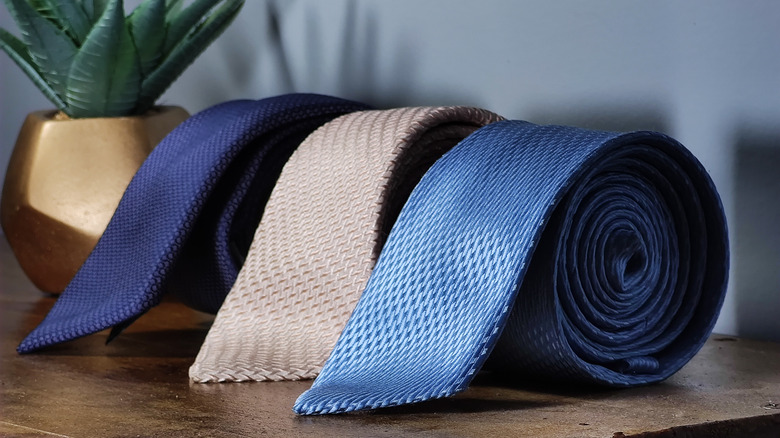What Happens To Your Body When You Wear Ties Every Day
For some of us, ties are a necessity every workday. Whether you're in business, the medical field, or academia, some office settings simply require a tie as part of the daily dress code. Thankfully, to many employees' relief, some workplaces have made the shift from formal to casual dress. In fact, a 2017 survey conducted by Robert Half Finance & Accounting found that 23% of CFOs believe their employee dress code has become more lax over the course of the last five years, with only 4% still requiring a suit and tie.
"Workplaces are evolving and so are office attire trends," said Paul McDonald, senior executive director at Robert Half. "Employees often prefer more relaxed attire, and having a casual dress code can be an enticement when recruiting finance and accounting professionals."
For that 4%, are there any potential health implications for wearing a tie every day? Your first thought might be that ties present a choking hazard, and while that may be so, it turns out that there are a lot of other ways ties can affect the body — beyond just being a fashion statement.
Ties can be a breeding ground for bacteria
In an interview with The People's Pharmacy, one doctor revealed that they had no official policy in place regarding the frequency of tie-washing for hospital staff. Ties are considered a standard part of many doctors' professional presentation. Therefore, infrequent washing of ties poses a risk for contamination. Research published in the journal Infection Control and Hospital Epidemiology in 2014 stated that nearly 70% of doctors have never washed their ties. As a result, staph infection-causing bacteria was detected on about 40% of ties.
Additionally, research has found that the constriction of ties limits blood flow to the brain (via Science Alert). These findings, published in Neuroradiology in 2018, were based on MRI scans of 30 different male participants. Among those wearing neckties, cerebral blood flow was decreased by over 7%. Steve Kassem of Neuroscience Research Australia commented on the study, stating that such a minimal reduction in blood flow is unlikely to pose any harm (via New Scientist).
On the flip side, ties may increase longevity
A 2003 study published in the British Journal of Ophthalmology found another way in which ties can increase pressure. The research concluded that the presence of a necktie can raise pressure behind the eyes, leading to potentially false diagnoses of glaucoma in patients.
The effects of tie-wearing aren't all negative, however. Tie manufacturing company Bows-N-Ties reports that a 2009 survey found necktie wearers to be healthier than non-necktie wearers. They also showed signs of increased longevity. Those who are not required to wear ties to work miss nearly twice the amount of workdays due to illness than those who wear ties as part of their daily dress code.
While more research may be needed on the subject, it seems there are both pros and cons to donning a daily necktie. Depending on your unique medical history, you may want to consult with your doctor if you have concerns about the effects a tie may be having on your health.



